-
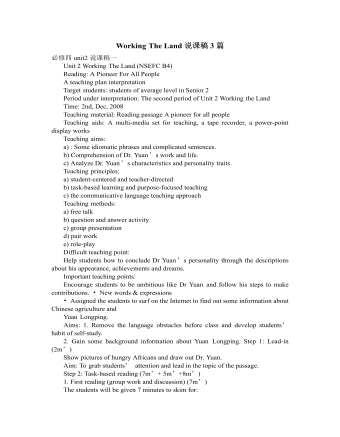
人教版高中英语必修4Working The Land说课稿3篇
Knowledge objectives:(1) to make Ss grasp the usage of words, expressions and sentence structures: statistics, struggle, thanks to, rid of, some patterns for persuasion, the “ing” form as subject and object;(2)to use learnt knowledge to persuade sb.Ability objectives:(1) to develop Ss’ reading skills(skimming, scanning, word guessing);(2) to improve Ss’ speaking, communicating and cooperating skills.Emotional objectives:to make Ss know the contribution of Yuan,and learn his spirit and his simple life time.Teaching important and difficult points:(1) some words, expressions and sentence structures mentioned above;(2)the content of the text;(3)training their reading and speaking skills.Teaching methods: CLT, TBLT,QT.Learning strategies: CLS, QLS, TBLS.Teaching procedures:Step 1 lead-in: (1) teacher plays a piece of recent news from CCTV about the harvest of the super hybrid rice, and ask students whether they know Yuan or not, and talk about him and his contribution.(2)Brain storm: let Ss describe Yuan in their minds including his appearance, his living condition and so on.Step 2 fast reading tasks:(1)teacher introduces Yuan and super hybrid rice(2)make Ss read the text as fast as possible with questions. Such as: what’s the general ideaof this passage? What’s Yuan’ dream? (skimming and scanning skill)Step 3 intensive reading tasks(1)let Ss read the text silently, find topic sentence of each paragraph and draw the difficult sentences and the knowledge what they don’t understand.(words guessing)(2)teacher and Ss talk about the important words, expressions and sentences together, and ask Ss to retell the content of the text.(summarizing and paraphrasing)(3)teacher summarize this part.(4) read again following the courseware.
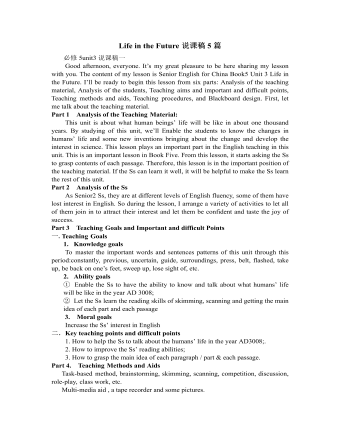
人教版高中英语必修5Life in the Future说课稿5篇
Good afternoon, everyone. It’s my great pleasure to be here sharing my lesson with you. The content of my lesson is Senior English for China Book5 Unit 3 Life in the Future. I’ll be ready to begin this lesson from six parts: Analysis of the teaching material, Analysis of the students, Teaching aims and important and difficult points, Teaching methods and aids, Teaching procedures, and Blackboard design. First, let me talk about the teaching material.Part 1 Analysis of the Teaching Material:This unit is about what human beings’ life will be like in about one thousand years. By studying of this unit, we’ll Enable the students to know the changes in humans’ life and some new inventions bringing about the change and develop the interest in science. This lesson plays an important part in the English teaching in this unit. This is an important lesson in Book Five. From this lesson, it starts asking the Ss to grasp contents of each passage. Therefore, this lesson is in the important position of the teaching material. If the Ss can learn it well, it will be helpful to make the Ss learn the rest of this unit.Part 2 Analysis of the SsAs Senior2 Ss, they are at different levels of English fluency, some of them have lost interest in English. So during the lesson, I arrange a variety of activities to let all of them join in to attract their interest and let them be confident and taste the joy of success.

人音版小学音乐二年级上册糖果仙子舞曲说课稿
在中提琴演奏一串同音反复的、三连音的过渡之后,由单簧管、大管和圆号呈现第二主题,它比较抒情:随后,钢片琴演奏一段华彩。这时,A段再现,这一次钢片琴比原来提高八度演奏,音色显得更加明亮。最后,轻轻地结束全曲。二、教学目标初步了解芭蕾舞剧,感受《糖果仙子舞曲》优美的情绪。三、教学重难点教学重点对乐曲进行体验实践,听辨乐曲的情绪。教学难点听辨不同乐器的音色特点。四、教学过程(一)导入播放《糖果仙子舞曲》,学生听辨音乐的情绪(优美动听)(二)感受乐曲导语:《糖果仙子舞曲》是舞剧《胡桃夹子》中糖果仙子一个人的独舞,我们来了解一下《糖果仙子舞曲》的故事。1.芭蕾舞剧《胡桃夹子》简介教师结合图片,简单讲述童话故事《胡桃夹子》以及芭蕾舞剧的特点。2.再次欣赏乐曲《糖果仙子舞曲》,引导学生想象音乐表现的情景。 随音乐,再次聆听,感受乐曲中乐器的音色特点。
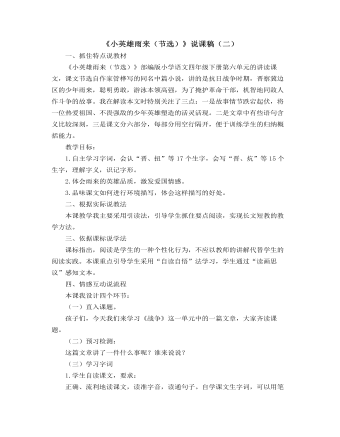
部编人教版四年级下册《小英雄雨来》说课稿(二)
一、抓住特点说教材《小英雄雨来(节选)》部编版小学语文四年级下册第六单元的讲读课文,课文节选自作家管桦写的同名中篇小说,讲的是抗日战争时期,晋察冀边区的少年雨来,聪明勇敢,游泳本领高强,为了掩护革命干部,机智地同敌人作斗争的故事。我在解读本文时特别关注了三点:一是故事情节跌宕起伏,将一位热爱祖国、不畏强敌的少年英雄塑造的活灵活现。二是文章中有些语句含义比较深刻,三是课文分六部分,每部分用空行隔开,便于训练学生的归纳概括能力。教学目标:1.自主学习字词,会认“晋、扭”等17个生字,会写“晋、炕”等15个生字,理解字义,识记字形。2.体会雨来的英雄品质,激发爱国情感。3.品味课文如何进行环境描写,体会这样描写的好处。

部编人教版四年级下册《小英雄雨来》说课稿(一)
【说教材】这篇课文节选自作家管桦写的同名中篇小说,选入课文时有改动,讲的是在那战火连天、枪炮轰鸣的抗日战争时期,晋察冀边区的少年雨来,聪明勇敢,游泳本领高强,为了掩护革命干部,机智地同敌人作斗争的故事,本文围绕这一主题,课文分六个部分叙述。【说目标】1.自学生字新词,掌握读音,理解词义;(课前完成)2.用比较快的速度默读课文,练习给每部分加上小标题3.理解课文内容,体会雨来与敌人英勇、顽强、机智地作斗争的英雄品质。

中班主题课件教案:筷子主题之各种各样的筷子
活动目标:1、通过看看、摸摸、玩玩使幼儿辨认各种筷子,了解筷子的特点与用途,并学习归类。2、让幼儿练习使用筷子,初步学会拨、夹物品,做到持筷姿势正确。活动准备:幼儿自带的不同材料制成的筷子、每组上面一样夹的物品(如:一组蚕豆、一组泡漠、一组花生、一组玻璃球、一组纸条等。活动过程:㈠、观察各种各样的筷子,将幼儿所带筷子布置成展览会。1、看看桌子上有什么?我们来把它布置成展览会。2、交流:你带的筷子是什么样的?叫什么名字?有什么用处?

人教版高中语文必修1《小狗包弟》教案2篇
巴金在十年浩劫中的大致经历:放弃包弟并没有换得保全一家人,1968年8月,巴金被关进牛棚改造,随后经受了大字报、挂牌游街等形式的批斗。1970年,到农村改造,掏大粪、喂猪、背稻草、种地……1972年,妻子萧珊在饱受精神折磨后患上癌症,病逝。巴金的儿子在劳动改造的过程中也饱受精神和肉体上的折磨,性格变得内向抑郁,疾病缠身。此时,巴金69岁。巴金曾在《病中》一文写道:“当姚文元拿着棒子的时候,我给关在牛棚里除了唯唯诺诺之外,敢于做过什么事情?十年间我不过是一条含着眼泪等人宰割的牛。”小结:(幻灯片12)社会是病态的社会,政治是高压的政治,人性是扭曲的人性。十年文革,十年浩劫,给多少人留下了累累不可弥合的精神创伤。即使一条小狗,也可能摆脱不了“文革”无情的迫害,比如包弟,比如艺术家邻居的小狗。
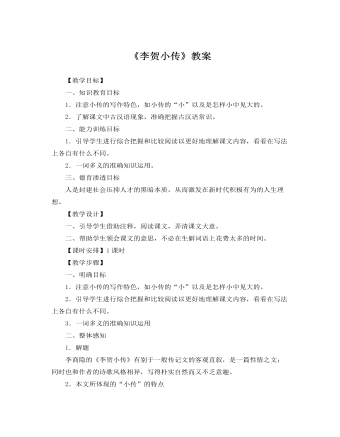
人教版高中语文必修4《李贺小传》教案
一、明确目标1.注意小传的写作特色,如小传的“小”以及是怎样小中见大的。2.引导学生进行综合把握和比较阅读以更好地理解课文内容,看看在写法上各自有什么不同。3.一词多义的准确知识运用二、整体感知1.解题李商隐的《李贺小传》有别于一般传记文的客观直叙,是一篇性情之文;同时也和作者的诗歌风格相异,写得朴实自然而又不乏意趣。2.本文所体现的“小传”的特点本文最大的特点在于:小传虽小,但小中有大、以小见大。其“小”在于:作者并没有全面勾勒诗人李贺的一生,对他的生平经历也记叙不多,而是选取了他生活中的若干小片段进行插叙,以小片段撑起传记的主干。此外,在篇幅上,全文寥寥数百字,语言极为精练。而其“大”又体现在:极小极短的篇幅却具有很大的容量,集叙事、议论和曲折的抒情于一体。内容浑厚,意味深长。

人教部编版语文八年级下册小石潭记教案
结束语:怀才不遇的柳宗元,他像陶渊明一样“采菊东篱下,悠然见南山”,也像吴均一样“从流飘荡,任意东西”,面对“凄神寒骨,悄怆幽邃”的小石潭,他选择“记之而去”,这其实体现的是柳宗元的人生态度。他有着高贵的灵魂,选择了自己想要的人生。在柳宗元身上,我们看到了古代圣贤在人生困顿之时坚守的济世情怀,那么我们又该如何实现人生的价值呢?这是我们要认真思考的一个人生命题。【设计意图】本环节通过抓住景物特点,帮助学生揣摩分析作者情感,体会寓情于景的特点。并通过插入作者的相关背景,引导学生准确把握作者心情由乐而悲的缘由,依据文本,具体深入而非概念化地理解作者“悲”的由来。三、存储总结1.师小结山水游记的写法(1)合理安排写景方法。如移步换景、定点观察等。(2)细致生动地描绘游览过程中所看到的主要景物,突出其特点。(3)巧妙地运用多种修辞手法、描写手法,使语言生动优美,富于变化。(4)融情于景,情景交融。2.推荐阅读课后阅读“永州八记”中的其他篇目。
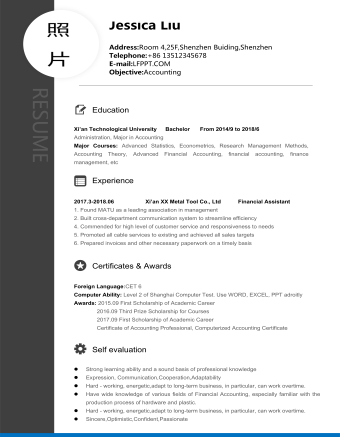
财务人员英文简历
l Strong learning abilityand a sound basis of professional knowledgel Expression,Communication,Cooperation,Adaptabilityl Hard - working,energetic,adapt to long-term business, in particular, can work overtime.l Have wide knowledge ofvarious fields of Financial Accounting, especially familiar with the productionprocess of hardware and plastic.l Hard - working,energetic,adapt to long-term business, in particular, can work overtime.l Sincere,Optimistic,Confident,Passionate

英文简历个人求职模板
WorkexperienceJob Position// 2013 - presentCOMPANY NAMECity, CountryLorem ipsum dolorsit amet, consectetur adipiscing elit. Integer varius dapibus odio vitaeinterdum. Donec in accumsan lorem, id aliquam dui.Job Position// 2013 - presentCOMPANY NAMECity, CountryLorem ipsum dolorsit amet, consectetur adipiscing elit. Integer varius dapibus odio vitaeinterdum. Donec in accumsan lorem, id aliquam dui.Job Position// 2013 - presentCOMPANY NAMECity, Country
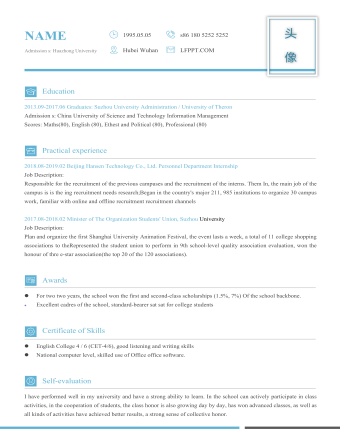
英文简历考研复试配套版
2018.08-2019.02Beijing HansenTechnology Co., Ltd. Personnel Department InternshipJob Description:Responsible for the recruitment of theprevious campuses and the recruitment of the interns. Them In, the main job ofthe campus is is the ing recruitment needs research;Began in the country'smajor 211, 985 institutions to organize 30 campus work, familiar with onlineand offline recruitment recruitment channels2017.08-2018.02Minister of The Organization Students' Union,SuzhouUniversityJob Description:Plan and organize the first ShanghaiUniversity Animation Festival, the event lasts a week, a total of 11 collegeshopping associations to theRepresented the student union to perform in 9thschool-level quality association evaluation, won the honour of thre e-starassociation(the top 20 of the 120 associations).
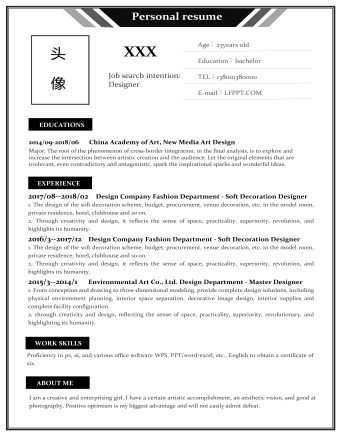
黑白简约英文简历
2017/08--2018/02 Design Company Fashion Department - SoftDecoration Designer1. The design ofthe soft decoration scheme, budget, procurement, venue decoration, etc. in themodel room, private residence, hotel, clubhouse and so on.2. Throughcreativity and design, it reflects the sense of space, practicality,superiority, revolution, and highlights its humanity.2016/3--2017/12 Design Company Fashion Department - SoftDecoration Designer1. The design ofthe soft decoration scheme, budget, procurement, venue decoration, etc. in themodel room, private residence, hotel, clubhouse and so on.2. Throughcreativity and design, it reflects the sense of space, practicality,superiority, revolution, and highlights its humanity.2015/3--2014/1 Environmental Art Co., Ltd. Design Department- Master Designer1. Fromconception and drawing to three-dimensional modeling, provide complete designsolutions, including physical environment planning, interior space separation,decorative image design, interior supplies and complete facility configuration.2, throughcreativity and design, reflecting the sense of space, practicality,superiority, revolutionary, and highlighting its humanity.
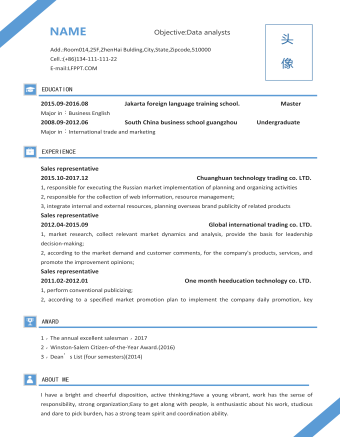
英文简历(简洁版)
Sales representative2015.10-2017.12 Chuanghuantechnology trading co. LTD.1, responsible for executing the Russian market implementation of planningand organizing activities2, responsible for the collection of web information, resource management;3, integrate internal and external resources, planning overseas brandpublicity of related productsSales representative2012.04-2015.09 Globalinternational trading co. LTD.1, market research, collect relevant market dynamics and analysis, providethe basis for leadership decision-making;2, according to the market demand and customer comments, for the company'sproducts, services, and promote the improvement opinions;Sales representative2011.02-2012.01 Onemonth heeducation technology co. LTD.1, perform conventional publicizing;2, according to a specified market promotion plan to implement the companydaily promotion, key projects, cooperation projects, product release PRplanning and execution

市场营销英文简历
2015.07-2015.09 Bank of China Customer service Job description:lProviding custom service including 7*24 financialconsultations, trading assistants, Q&As and customer cares throughtelephone and internet.lIn the cases of which clients’ problems could not be solvedonline, transfer the information to the back staff to settle, and track thesettlements before communicating with the clients.lAbiding the regulations and working closely with theoperating administration and other co-workers.2015.07-2015.09 Bank of China Customer service Job description:lProviding custom service including 7*24 financialconsultations, trading assistants, Q&As and customer cares throughtelephone and internet.lIn the cases of which clients’ problems could not be solvedonline, transfer the information to the back staff to settle, and track thesettlements before communicating with the clients.

单页简洁英文简历
Guangzhou Friendship HotelAssistant Banquet Manager--responsible for planning and coordination of200 banquets and private parties per year for 10 to 500 guests (businessmeetings, personal celebrations, community events). Meal planning and themedevelopment in consultation with banquet hosts。Dongdan Restaurant.Waiter——Served in morningtea hall and lunch hall.
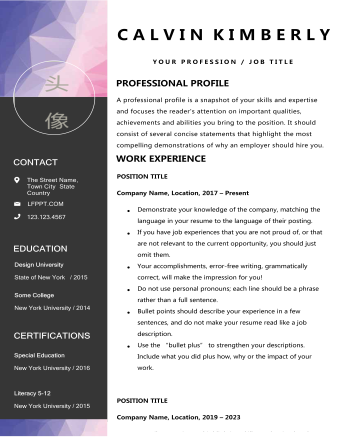
创意英文简历求职模板
POSITIONTITLE CompanyName, Location, 2017– Present· Demonstrate your knowledge of thecompany, matching the language in your resume to the language of their posting.· If you have job experiences thatyou are not proud of, or that are not relevant to the current opportunity, youshould just omit them.· Your accomplishments, error-freewriting, grammatically correct, will make the impression for you!· Do not use personal pronouns; eachline should be a phrase rather than a full sentence.· Bullet points should describe yourexperience in a few sentences, and do not make your resume read like a jobdescription.· Use the “bullet plus” tostrengthen your descriptions. Include what you did plus how, why or the impactof your work.

金融会计创意风英文简历
AccountingAssistantAlvakin and Sons Inc. | 2011-2016January 2020 - May 2020Assisted in collecting data and creating budgetreports and documentsHoned my skills and expertise as an accountant ina professional environmentSenior AccountantOcular BeamEnterprises | 2016-2020Managed theaccounting department with day-to-day dutiesInspected andreviewed all budget reports and documents before they left the office
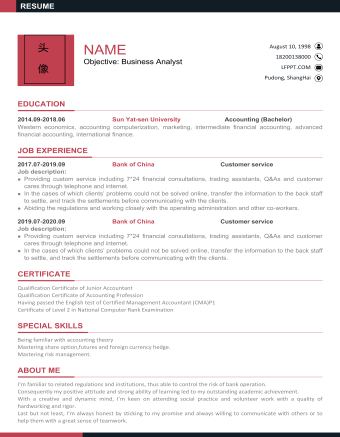
简约证券金融英文简历
2017.07-2019.09 Bank of China Customer service Job description:lProviding custom serviceincluding 7*24 financial consultations, trading assistants, Q&As andcustomer cares through telephone and internet.lIn the cases of which clients’problems could not be solved online, transfer the information to the back staffto settle, and track the settlements before communicating with the clients.lAbiding the regulations andworking closely with the operating administration and other co-workers.2019.07-2020.09 Bank of China Customer service Job description:lProviding custom serviceincluding 7*24 financial consultations, trading assistants, Q&As andcustomer cares through telephone and internet.lIn the cases of which clients’problems could not be solved online, transfer the information to the back staffto settle, and track the settlements before communicating with the clients.

英文翻译合同范例书
英文翻译 -> 合同书合同编号:甲方全名:乙方全名:中国专家网络有限公司法定地址:法定地址:深圳市人民南路XX号发展中心大厦31F电话/传真:电话/传真:(0755) 82209555 甲乙双方经友好协商,就资料翻译服务事宜签订此合同。合同中价格以人民币为单位(含税)。一、甲方委托乙方将主题为_______________资料由__________文译成__________文,资料共计为字(终以实际的翻译字数为准),甲方同意为此交付对应的服务费用。二、交稿日期及方式:从合同生效日(即甲方支付翻译费定金日)开始的_____天内(不包括周六,周日),也就是XX年_____月_____日起至XX年_____月_____日止。如果实际的翻译字数超过了合同约定字数,则按每日平均_____字的速度顺延。如果乙方在合同期内未能完成该翻译项目,则乙方必须按照甲方指定的日期内完成未完成的部分(即该部分免费)。如果仍未按时完成,则甲方有权仅支付乙方翻译费用总额的50%。稿件交付方式为_____。为减轻双方核算的麻烦,双方在此同意,乙方交稿后,甲方在两日内(确认期)对其予以确认,包括数量和质量。超过两日甲方未做任何答复,则视为甲方对乙方所交付的翻译稿件为可接受之稿件。


